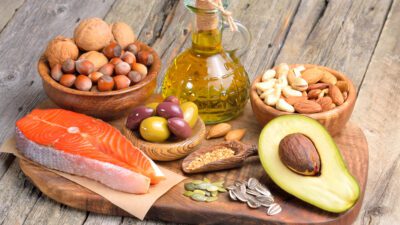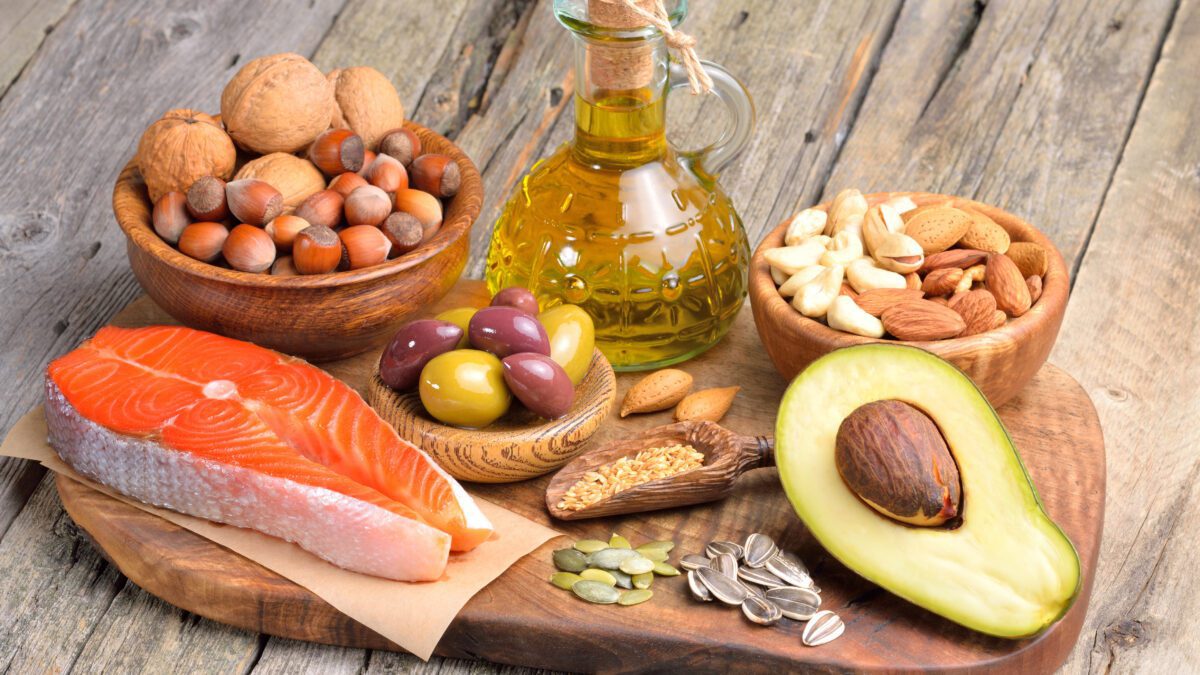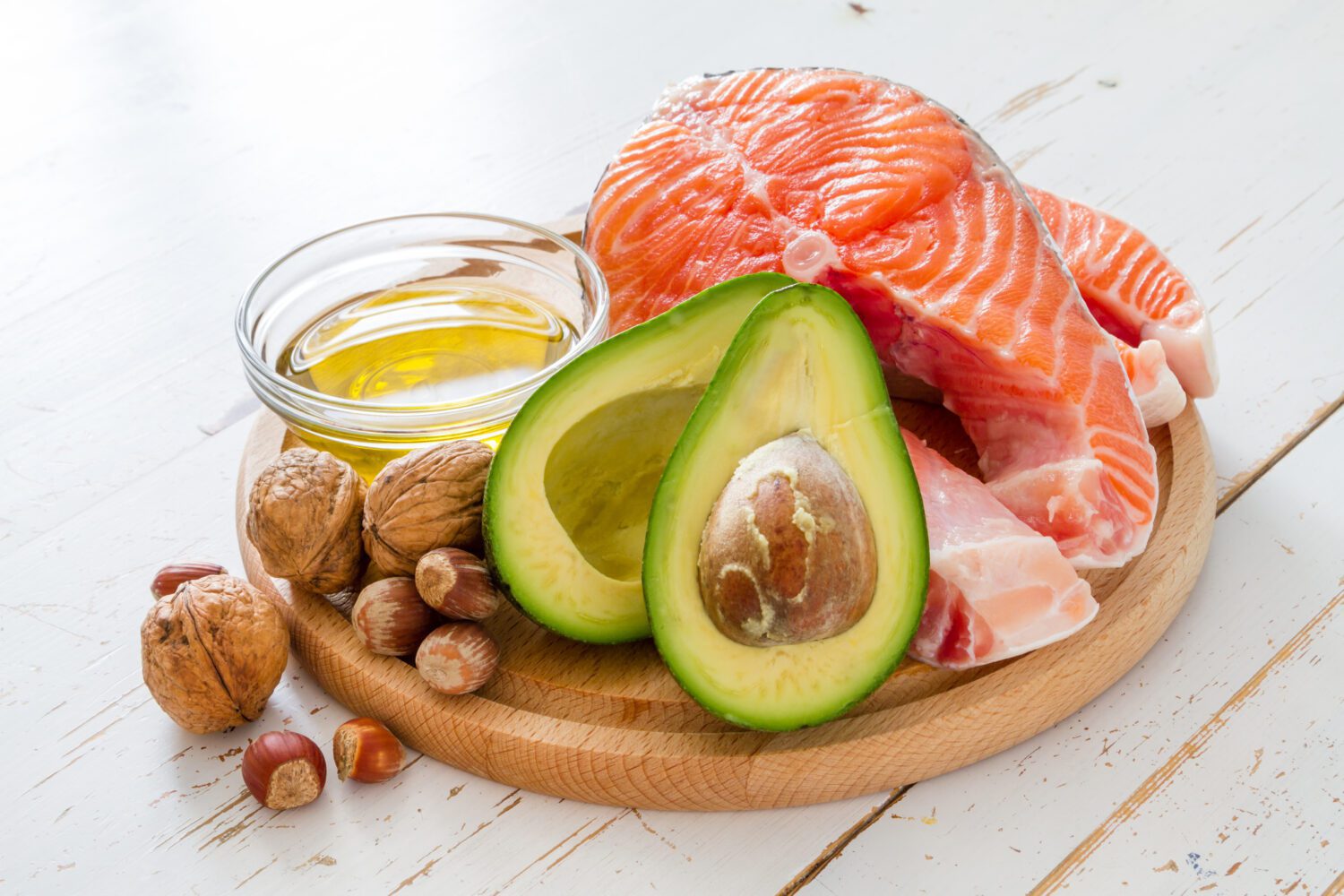



When we think of fat, we usually think of it negatively and relate it to the onset of conditions such as obesity, diabetes and cardiovascular diseases. However not all fats are bad for you, some are beneficial for your health and can promote better wellbeing.
It is clear that dietary fats (fatty acids) are found in both plants and animals. Fat is an essential part of your diet as some bodily functions rely on the presence of fat (1). For example, some vitamins cannot dissolve into the bloodstream and provide your body with nutrients if there is no fat present (1).
Eating excessive amounts of calories from any type of fat, whether good or bad can contribute to unhealthy weight gain.
‘Bad’ fat-saturated and trans fats have been recognised as potentially harmful to the heart (2). Foods that contain saturated and trans fats include butter, margarine and beef or pork fat. These kinds of fats should be eaten sparingly or avoided altogether.
Saturated fat is typically found in animal-based foods and dairy products (2). Studies have found that consuming excessive amounts of saturated fats can increase blood cholesterol levels and low-density lipoprotein (LDL) levels. This can cause an increased risk towards the development of heart disease and type 2 diabetes (3, 4).
Trans fats appear in foods that contain partially hydrogenated vegetable oils, these are worse than saturated fats (2). Trans fat can be found in fried foods, baked goods such as pastries, cakes and cookies and processed snack foods such as microwavable popcorn (5). This kind of fat can also raise LDL ‘bad’ cholesterol levels and suppress levels of the ‘good’ cholesterol, high-density lipoprotein (HDL)(5). As a result, the risk of heart disease is much higher than if you were to consume only saturated fats (5, 6).

‘Good’ fats, also known as healthy fats are monounsaturated fat and polyunsaturated fat. These are considered ‘heart-healthy’ and can be included in a diet in moderation (6, 7).
Monounsaturated fat can be found in a variety of foods and oils. There is a consistent amount of research that suggests that monounsaturated fat foods can actually improve blood cholesterol levels and decrease the risk of cardiovascular diseases (8). Foods that contain monounsaturated fats include nuts, vegetable oils, peanut butter and avocados.
Polyunsaturated fats can primarily be found in plant-based foods and oils. Similar to monounsaturated fats, polyunsaturated fats can decrease the risk of heart disease by lowering levels of blood cholesterol (9).
A certain type of polyunsaturated fat, omega-3 fatty acids has been found to be particularly beneficial for heart health. They not only lower the risk of coronary artery disease but can also lower blood pressure and protect against irregular heartbeats (9). Omega-3 fatty acids can be easily consumed by eating fatty fish such as salmon, sardines and trout.
While sources like salmon, sardines, and trout are widely recognized for their omega-3 benefits, there’s growing interest in plant-based alternatives that suit vegan diets. For individuals seeking these benefits without fish products, exploring high-quality vegan omega-3 supplements becomes essential to ensure they’re not missing out on these crucial nutrients.
Healthy fats have numerous benefits for your body when included as part of a healthy balanced diet. A diet that includes moderate to high amounts of monounsaturated fats can be useful in weight loss, as long as you don’t eat more calories than you are burning. A large study that combined the results of twenty-four other studies found that participants who followed a high-monounsaturated fat diet had more effective weight loss than those who followed high-carbohydrate diets (10).
Healthy fats can reduce the risk factors for heart disease, especially if you are trying to replace ‘bad’ saturated fat. Many studies have found that a high intake of monounsaturated fats can reduce levels of blood cholesterol and triglycerides (11, 12). Other smaller studies have found that monounsaturated fats can reduce ‘bad’ LDL cholesterol and increase the amounts of ‘good’ HDL cholesterol (13).
Following a high monounsaturated fat diet can be beneficial for improving insulin sensitivity in both individuals who have, or do not have high blood sugar levels. One study found that following a high monounsaturated fat diet for three months managed to improve insulin sensitivity by up to nine per cent (14). This was followed by another study which found participants who had metabolic syndrome and followed a high monounsaturated fat diet for twelve weeks had a significant reduction in insulin resistance (15).
By replacing bad fats in your diet with healthy fats, your body can reap a number of health benefits from healthy fats and lower its risk of developing heart conditions. For more information on healthy fats and how they can benefit you, see our nutrition and weight management course.
[Sources]